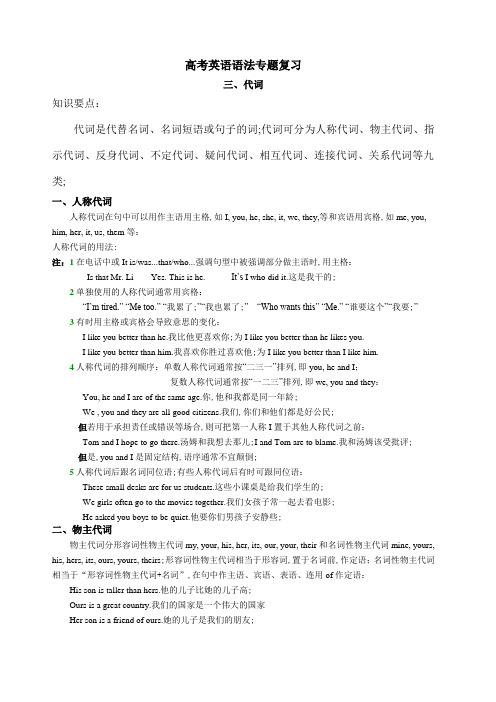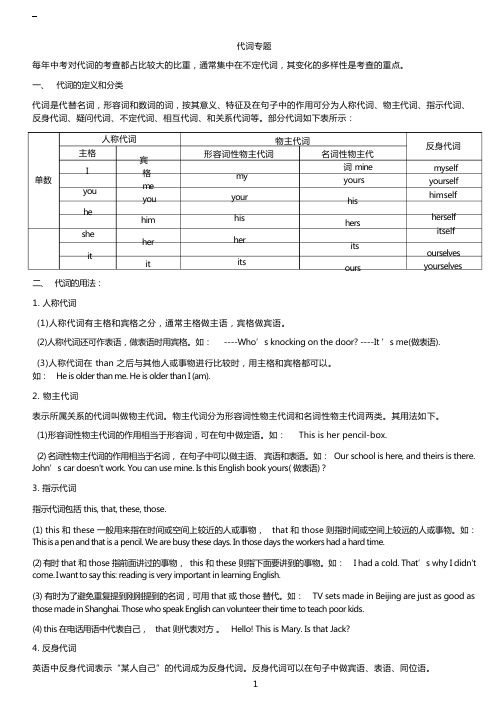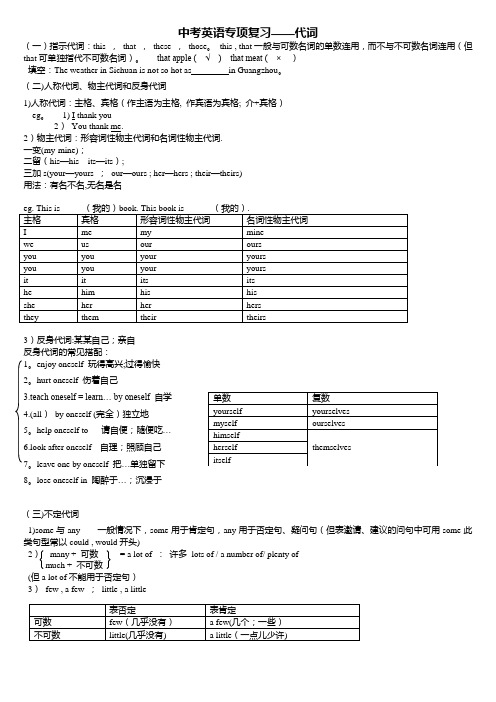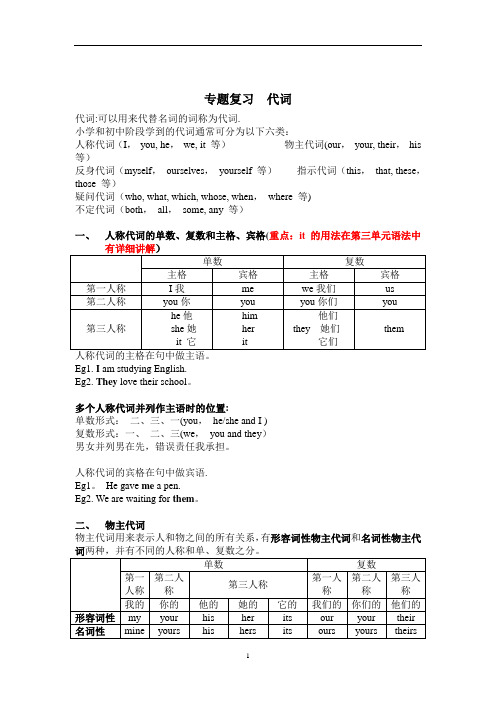英语代词专题
高考英语语法专题复习代词

高考英语语法专题复习三、代词知识要点:代词是代替名词、名词短语或句子的词;代词可分为人称代词、物主代词、指示代词、反身代词、不定代词、疑问代词、相互代词、连接代词、关系代词等九类;一、人称代词人称代词在句中可以用作主语用主格,如I, you, he, she, it, we, they,等和宾语用宾格,如me, you, him, her, it, us, them等:人称代词的用法:注:1在电话中或It is/was...that/who...强调句型中被强调部分做主语时,用主格:---Is that Mr. Li ---Yes. This is he. It’s I who did it.这是我干的;2单独使用的人称代词通常用宾格:“I’m tired.” “Me too.” “我累了;”“我也累了;”“Who wants this” “Me.” “谁要这个”“我要;”3有时用主格或宾格会导致意思的变化:I like you better than he.我比他更喜欢你;为I like you better than he likes you.I like you better than him.我喜欢你胜过喜欢他;为I like you better than I like him.4人称代词的排列顺序:单数人称代词通常按“二三一”排列,即you, he and I;复数人称代词通常按“一二三”排列,即we, you and they:You, he and I are of the same age.你,他和我都是同一年龄;We , you and they are all good citizens.我们,你们和他们都是好公民;但若用于承担责任或错误等场合,则可把第一人称I置于其他人称代词之前:Tom and I hope to go there.汤姆和我想去那儿;I and Tom are to blame.我和汤姆该受批评;但是,you and I是固定结构,语序通常不宜颠倒;5人称代词后跟名词同位语;有些人称代词后有时可跟同位语:These small desks are for us students.这些小课桌是给我们学生的;We girls often go to the movies together.我们女孩子常一起去看电影;He asked you boys to be quiet.他要你们男孩子安静些;二、物主代词物主代词分形容词性物主代词my, your, his, her, its, our, your, their和名词性物主代词mine, yours, his, hers, its, ours, yours, theirs;形容词性物主代词相当于形容词,置于名词前,作定语;名词性物主代词相当于“形容词性物主代词+名词”,在句中作主语、宾语、表语、连用of作定语:His son is taller than hers.他的儿子比她的儿子高;Ours is a great country.我们的国家是一个伟大的国家Her son is a friend of ours.她的儿子是我们的朋友;This is your pen. Mine is in the box.这是你的铅笔,我的在铅笔盒里;注:1 a friend of mine ours, yours, hers, his, theirs结构2 物主代词与own连用;表强调;也可用of one’s own置于名词后作定语:Mind your own business.别管闲事;I saw it with my own eyes.那是我亲眼看到的;I hope to have a room of my own. / I hope to have my own house.我希望有自己的房子;三、指示代词指示代词是用来指代或标记人或事物的代词,表示“这个,这些”“那个,那些”;在句中可作主语、宾语、表语、定语;单数:this, that;复数:these, those;为了方便学习将such,so也归于此类;I like these and he likes those.我喜欢这些,他喜欢那些;What I want to say is this.我想说的就是这点;注:1 指示代词用作主语和定语时,可指人或物;用作宾语和表语时,只指物;如:This is my father. 作主语,指人Do you know this作宾语,指物,译为“你知道这个情况吗2 刚提到的或已经完成的事情时用that,但是若要指下文将要发生或将要提到的事情通常用this:She married Jim, and that surprised me.她嫁给了吉姆,这使我感到很吃惊;I want to know this: Is he healthy我想知道这一点:他是否很健康;3 在打电话时,通常用this指自己,用that指对方:Hello. This is Jim. Is that John喂,我是吉姆,你是约翰吗4 such指代前面所述的这样的人或事;如:Such is Albert Einstein, a famous physicist, but a simple man. 这就是艾尔伯特,爱因斯坦,......5 so代替一个句子或短语表达的事情;a.在believe,expect,suppose,imagine,think等词后用so代替前文观点;表肯定、否定=not均可;b. 用于表示肯定的hope,I’m afraid后,代替前文提出的观点;四、反身代词反身代词是oneself根据所指词的人称、性别、单复数等变化的词单数:myself, yourself,himself, herself, itself, 复数:ourselves, yourselves, themselves,在句中可作宾语、表语、同位语,不能作主语; 注:1用作同位语加强被修饰词的语气,紧放在被修饰名词后,或句末:The box itself is not so heavy.箱子本身并不重;You yourself said so. / You said so yourself.你自己是这样说的;2用作宾语动词或for,of, in, by, to等介词的宾语:She could not make herself understood.她不能使别人听懂她的话;You’ll have to see if he has come for yourself. for one self 亲自,为自己The computer may shut off of itself. of oneself 自动的You shouldn’t leave the child at home by herself. b y oneself 独自,单独Jim isn’t bad in himself, but he likes playing tricks on others. in one self 本身He likes a table to himself. to oneself 独自占用3 用作表语:有时用于be, feel, seem, look等后作表语表示身体或精神处于正常状态:The poor boy was myself.那个可怜的孩子就是我自己;The ones who really want it are ourselves.真正想要它的是我们自己;I'm not quite myself these days.我近来身体不大舒服;I'll be myself again in no time.我过一会儿就会好的;4 含有反身代词的动词短语:devote oneself to=be devoted to 专心于;lose oneself=be lost in 迷失;seat oneself= be seated 坐下; express oneself 表达某人的思想; say for oneself 为自己找借口;say to oneself 心想; talkto oneself 自言自语; feel oneself 觉得正常; come to oneself 苏醒;五、疑问代词疑问代词包括who, whom, whose,which, what,在句中可用作主语、表语、宾语、定语等:1、who与whom的用法:前者为主格,用作主语、宾语,后者为宾格,用作宾语;Who spoke at the meeting Whom are you talking about口语中或作宾语的whom位于句首时,通常可用who代替,但whom前有介词时除外:Whom is the letter from2、whose的用法:表示“谁的”,既可用于名词前作定语,也可单独使用;在句中作主、宾、表、定语;Whose is better, yours or hers作主语Whose do you love better, yours or hers作宾语Tom has already taken his bag is this作表语Whose bag do you like作定语3、what和which的用法:有选择范围时,多用which;无选择范围或不明确时,多用what;拓展:what的习惯用法:1 What...for... 和What for 用于询问原因和目的;---What did you put it into the soup for --- It would improve the taste.你为什么...---I’m going to the grocery store. ---What for We still have enough food in the apartment.为何啊(2)What if...表示假设、建议、征求意见或疑虑;What if it rains while we are on the way(3)What do you mean by...表示愤怒、不满等情绪;What do you mean by shutting the door so loudly(4)What/How about...用于征求对方意见、询问对方的情况;(5)疑问词what构成的固定搭配;So what那又怎么样呢表示不感兴趣或认为不重要What next店员用语还要什么Guess what你猜怎么着用于引起他人的注意What can I do for you你要买借什么4、what和who的区别:一般来说;what问职业、地位等,who问姓名或关系等:Who is he他是谁What is he他是干什么的六、相互代词相互代词只有each other和one another,它们在句中通常只用作宾语:We should help each other.我们应该互相帮助;They respect one another.他们互相尊重对方;The sea and the sky seem to melt into each other.大海和蓝天似乎融为一体;注:1相互代词在句中通常只用作宾语,不可作主语,所以以相互代词为宾语的句子不能变为被动语态;2不要将相互代词误认为是副词,将其用作状语,如可说talk to each other,但不能说talk each other;3相互代词可以有所有格形式:The students borrowed each other's notes.学生们互相借笔记;4有时可分开用:We each know what the other thinks.我们都知道对方的想法;七、不定代词1.不定代词概说;英语的不定代词有all, each, both, either, neither, one, none, little, few, many, much, other, another, some, any, no,few,little, both, enough, every等,以及由some, any, no和every构成的合成代词即somebody, anyone, nothing等;在这些不定代词中,多数都能作主语、宾语、表语或定语,但是代词none以及由some, any, no和every构成的合成代词只能作主语、宾语或表语,不能作定语,而no和every则只用作定语;2.指两者和三者的不定代词;有些不定代词用于指两者如both, either, neither,有的不定代词用于指三者如all, any, none, every,注意不要弄混:Both of my parents are doctors.我的父母都是医生;All of the students are interested in it.所有的学生对此都很感兴趣;There are trees on any side of the square.广场的每一边都种有树;He has two sons, neither of whom is rich.他有两个儿子,都不富有;He has three sons, none of whom is rich.他有三个儿子,都不富有;注:each可用于两者、三者或三者以上,而every只用于三者或三者以上,因此用于两者时只能用each,不能用every;如不能说There are trees on every side of the road.3.复合不定代词的用法特点;复合不定代词包括something, somebody, someone, anything, anybody, anyone, nothing, nobody, no one, everything, everybody, everyone等;它们在句中可用作主语、宾语或表语,但不能用作定语;something, someone等和anything, anyone等的区别与some和any的区别一样,前者一般用于肯定句,后者一般用于否定句、疑问句或条件句参见any & some;具体使用时应注意以下几点:1复合不定代词受定语修饰时,定语应放在它们后面:There is nothing wrong with the radio.这收音机没有毛病;Have you seen anyone anybody famous你见过名人吗2指人的复合不定代词若用作主语,其谓语动词一般用单数,相应的人称代词和物主代词也用单数he, him, his 不一定指男性;但在非正式文体中常用复数代词they, them, their:Everyone knows this, doesn't he don't they人人都知道这一点,不是吗If anybody anyone comes, ask him them to wait.要是有人来,让他等着;3指事物的复合不定代词若用作主语,谓语动词只能用单数,相应的人称代词也只能用it,而不用they:Everything is ready, isn't it一切都准备好了,是吗4anyone, everyone等只能指人,不能指物,且其后一般不接of短语;若是指物或后接of短语,可用any one, every one 分开写:any one of the boys books孩子们书当中的任何一个本every one of the students schools每一个学生一所学校4.是any not还是not any;按英语习惯,any以及含有any的复合不定代词用于否定句时,它只能出现在否定词之后,而不能在否定词之前:误:Any one doesn't know how to do it.正:No one knows how to do it.任何人都不知道如何做它;误:Anybody Anyone cannot do it.正:Nobody No one can do it.这事谁也干不了;误:Anything cannot prevent me from going.正:Nothing can prevent me from going.什么也不能阻挡我去;5.不定代词与部分否定;不定代词all, both, every等与not连用时构成部分否定;若要表示完全否定,则需换用none, neither, no one等;比较:All of the students like the novel.所有这些学生都喜欢这本小说;Not all of the students like the novel.并不是所有这些学生都喜欢这本小说;All of the students don’t like the novel.并不是所有这些学生都喜欢这本小说;None of the students like the novel.这些学生当中没有一个喜欢这本小说;6.all, both, each等用作同位语;若用作主语同位语,主语可以是名词或代词;若用作宾语等其他成分的同位语,则宾语等成分必须是人称代词,而不能是名词:We have all read it.我们都读过他;all修饰的主语是代词The villages have all been destroyed.村庄都被毁了;all修饰的主语是名词They told us all to wait there.他叫我们都在那儿等;all修饰的宾语是代词但不能说:They told the men all to wait there. all修饰的宾语是名词不是代词7.so little与such little的区别;用so little还是such little取决于little的意思:若表示数量方面的“少”,则用so little;若表示形状体积的“小”,则用such little:He has so little time for reading.他读书的时间少得可怜;I've never seen such little boxes.我从未见过那样小的盒子;8.some与any的用法区别;一般说来,some用于肯定句中,any用于否定句和疑问句中;但是,在表示请求、邀请或征求意见的句子中,通常要用some而不用any:Would you like some cake吃点蛋糕吗Why not buy some bread为什么不买些面包呢Shall I get some chalk for you要我帮你拿些粉笔来吗注:any有时也用于肯定句中,此时表示“任何”:Any colour will do.任何颜色都行;Come any day you like.随便哪天来都可以;9.many与much的用法区别;两者都表示“许多”,但many修饰或代替可数名词复数,与few少数相对;而much用来修饰或代替不可数名词单数,与little少量相对;在口语中两者主要用于非肯定句中:Did you see many people there你在那儿看见许多人了吗We don't have much time.我们没有许多时间;在肯定句中,一般用a lot of, lots of, plenty of等代之;但在正式文体中有时也用于肯定句中;另外,若用作主语或主语的定语,或其前有how, too, as, so, a good, a great等修饰,也可用于肯定句中:Many of us left early.我们有许多人离开得很早;Much work has been done.许多工作都已经做了;You've given me too much.你已给我太多了;Take as many much as you want.你要多少拿多少;I asked her a great many questions.我问了她许多问题;10.few, a few与little, a little的用法区别;1few和a few后接可数名词的复数形式;few表示数量很少或几乎没有,强调“少”,含有否定意义;a few表示数量虽然少但毕竟还有,强调“有”,含有肯定意义:It is very difficult, and few people understand it.它很难,没有几个人能懂;It is very difficult, but a few people understand it.他虽难,但是有些人懂;2little和a little之后接不可数名词,其区别跟few和a few之间的区别相似:Unfortunately, I had little money on me.很不巧,我身上没带什么钱;Fortunately, I had a little money on me.幸好我身上带着一点钱;11.other, the other, another与others的用法区别:这些不定代词不仅在含义上有单复数之分,而且在用法上有泛指无the和特指有the之别;其用法区别可归纳如下:1指单数时,若泛指用another,若特指用the other:Give me another one.另外给我一个;Shut the other eye, please.请把另一只眼睛也闭上;2指复数时,若泛指用other后接复数名词,若特指用the other后接复数名词:There are other ways of doing it.做这事还有其他的办法;Where have the other students gone其他学生都到哪里去了3others永远表示复数意义且其后不能再接名词;其用法大致相当于“other+复数名词”,同样地the others大致相当于“the other+复数名词”:Other people Others may not think that way.别的人可能不这样想;He is cleverer than the others the other students in her class.他比班上其他学生聪明;4another一般只能表单数,且其后接名词也只能接单数名词;但是若其后有数词或few修饰时,则也可接复数名词:We need another few chairs.我们还需要几把椅子;In another two weeks it'll be finished.再过两个星期就可做完了;5与some对比使用时,用others此时与some同义:Some say yes, and others say no.有人说对,有人说不对;12.不定代词与语境考题;不定代词是高考的常考考点,有的不定代词考题出得比较灵活,不能死套规则,要注意结合语境来理解:1“Is ____ here” “No, Bob and Tim have asked for leave.”A. anybodyB. everybodyC. somebodyD. nobody若只是从表面来看,填空句是个疑问句,可能会误选A;但其实此题最佳答案应选B,因为下文的答句说“只有Bob和Tim请假了”,这说明问句是在查人数,故用Is everybody here 大家都到齐了吗2I agree with most of what you said, but I don't agree with _____.A. everythingB. anythingC. somethingD. nothing此句若从表面看,有可能误选B,因为填空句为否定句;但实际上最佳答案为A,因为上文说“我同意他说的大部分内容”,这与下文的but I don’t agree with everything但并不是同意他说的所有内容完全相符;3“Do you have _____ at home now, Mary” “No, we still have to get some fruit and tea.”A. somethingB. anythingC. everythingD. nothing答案选C,句意为“玛丽,现在家里东西都准备齐了吗”“还没有,我们还要买些水果和茶;”4“If you want a necklace, I’ll buy one for you at once.” “Oh, no. A necklace is not _____ that I need most. A. anythingB. somethingC. nothingD. everything此题容易误选A,机械地认为:something用于肯定句,anything用于否定句或疑问句;但是,此题的最佳答案是B,something在此的意思不是“某种东西”,而是指“那种东西”或“这种东西”,即心中最想要的那种东西相当于the thing;。
高中语法专题 代词

代词人称代词:I, you, he, she, we, they, me, him, her….物主代词:my, your, mine, yours, their, theirs, its…反身代词:myself, himself, ourselves, itself…相互代词:each other, one another指示代词:this, that, these, those疑问代词:who, whom, whose, what, which…关系代词:who, whom, whose, which…连接代词:who, whom, whose, which不定代词:all, both, one, some, few, either, any, other, another, many, none…一、人称代词主格:I, you, she, he, their, we宾格: me, you, her, him, their, us(1) 宾格代替主格a.在简短对话中,当人称代词单独使用或在not 后,多用宾语。
---- I like English. --我喜欢英语。
---- Me too. --我也喜欢。
---- Have more wine? --再来点酒喝吗?---- Not me. --我可不要了。
b.在比较级的句子中than、as后用主格、宾格都可以 ,如:He is taller than I/me.但在下列句中有区别:I like Jack as much as her.=I like both Jack and her.I like Jack as much as she.=I like Jack and she likes him, too(2)两个以上的人称代词并列,其次序排列原则:在并列主语中,“I”总是放在最后,排列顺序为:二三一(人称)。
宾格me也一样。
You ,she and I will be in charge of the caseMr.Zhang asked Li Hua and me to help him(3)几个人称代词的特殊用法。
高考英语代词专题(共101张PPT)

⑶ 反身代词可作动词或介词(by, for等) 的宾语; 或者作主语或宾语的同位语, 起加强语气的作用, 译作“亲自, 本人”。
注意: 反身代词不能单独作主语。
用所给代词的适当形式填空 1. This is not my pencil-box. _______ ( I ) is in the bag. 2. Trees are planted in ______ ( we ) country every year, which makes our country more and more beautiful. 3. ---Is that bike Miss Gao’s? ---Yes, it is ______(she) . Beautiful, isn’t it? 4. Help ______ (you) to some fruit, Jack. 5. ---Who taught your brother to surf? ---Nobody. He learnt all by _______ (he). 6. Their English teacher is from America, but ______ (we) is from England. 7. Mary’s answer is different from ________ ( I ). 8. ---My watch keeps good time. What about _______(you)? ---Mine? Oh, two minutes slow. 9. Sam is my brother. Do you like to play with ______ (he)? 10. Did you enjoy _______ (you), Mary and Kate?
代词专题(练习题含答案)

代词专题每年中考对代词的考查都占比较大的比重,通常集中在不定代词,其变化的多样性是考查的重点。
一、 代词的定义和分类代词是代替名词,形容词和数词的词,按其意义、特征及在句子中的作用可分为人称代词、物主代词、指示代词、 反身代词、疑问代词、不定代词、相互代词、和关系代词等。
部分代词如下表所示:二、 代词的用法: 1. 人称代词(1)人称代词有主格和宾格之分,通常主格做主语,宾格做宾语。
(2)人称代词还可作表语,做表语时用宾格。
如: ----Who’s knocking on the door? ----It ’s m e(做表语). (3)人称代词在 than 之后与其他人或事物进行比较时,用主格和宾格都可以。
如: He is older than me. He is older than I (am). 2. 物主代词表示所属关系的代词叫做物主代词。
物主代词分为形容词性物主代词和名词性物主代词两类。
其用法如下。
(1)形容词性物主代词的作用相当于形容词,可在句中做定语。
如: This is her pencil-box.(2) 名词性物主代词的作用相当于名词, 在句子中可以做主语、 宾语和表语。
如: Our school is here, and theirs is there. John’s car doesn't work. You can use mine. Is this English book yours( 做表语)? 3. 指示代词指示代词包括 this, that, these, those.(1) this 和 these 一般用来指在时间或空间上较近的人或事物, that 和 those 则指时间或空间上较远的人或事物。
如: This is a pen and that is a pencil. We are busy these days. In those days the workers had a hard time.(2) 有时 that 和 those 指前面讲过的事物, this 和 these 则指下面要讲到的事物。
中考英语专题复习:代词

中考英语专项复习——代词(一)指示代词:this , that , these , those 。
this , that 一般与可数名词的单数连用,而不与不可数名词连用(但that 可单独指代不可数名词)。
that apple ( √ ) that meat ( × )填空:The weather in Sichuan is not so hot as __ in Guangzhou 。
(二)人称代词、物主代词和反身代词1)人称代词:主格、宾格(作主语为主格, 作宾语为宾格; 介+宾格)eg 。
1) I thank you2) You thank me.2)物主代词:形容词性物主代词和名词性物主代词.一变(my-mine);二留(his —his its —its );三加s(your —yours ; our —ours ; her —hers ; their —theirs)用法:有名不名,无名是名3)反身代词:某某自己;亲自反身代词的常见搭配:1。
enjoy oneself 玩得高兴;过得愉快2。
hurt oneself 伤着自己3.teach oneself = learn… by oneself 自学4.(all ) by oneself (完全)独立地5。
help oneself to 请自便;随便吃…6.look after oneself 自理;照顾自己7。
leave one by oneself 把…单独留下8。
lose oneself in 陶醉于…;沉浸于(三)不定代词1)some与any一般情况下,some 用于肯定句,any 用于否定句、疑问句(但表邀请、建议的问句中可用some-此类句型常以could , would 开头)2) many + 可数 = a lot of : 许多 lots of / a number of/ plenty ofmuch + 不可数(但a lot of 不能用于否定句)3) few , a few ; little , a little①。
初中英语语法---代词专题(含练习)

专题复习代词代词:可以用来代替名词的词称为代词.小学和初中阶段学到的代词通常可分为以下六类:人称代词(I,you, he,we, it 等)物主代词(our,your, their,his 等)反身代词(myself,ourselves,yourself 等)指示代词(this,that, these,those 等)疑问代词(who, what, which, whose, when,where 等)不定代词(both,all,some, any 等)一、人称代词的单数、复数和主格、宾格(重点:it的用法在第三单元语法中Eg1. I am studying English.Eg2. They love their school。
多个人称代词并列作主语时的位置:单数形式:二、三、一(you,he/she and I )复数形式:一、二、三(we,you and they)男女并列男在先,错误责任我承担。
人称代词的宾格在句中做宾语.Eg1。
He gave me a pen.Eg2. We are waiting for them。
二、物主代词物主代词用来表示人和物之间的所有关系,有形容词性物主代词和名词性物主代形容词性物主代词不能单独使用,只做定语,用来修饰其后的名词。
Eg1。
My parents are both doctors.Eg2。
There’s something wrong with his bike.名词性物主代词应独立使用,后面不跟名词,相当于形容词性物主代词+名词,在句中可以作主语、宾语或标语.Eg1. Our classroom is on the second floor,and theirs is on the fourth floor. (作主语) Eg2。
Let's clean their room first, and then clean ours. (作宾语)Eg3。
中考英语语法专题—代词

中考英语语法专题—代词1.中考英语语法专题—代词篇1代词代词是代替名词的词类。
大多数代词具有名词和形容词的功能。
英语中的代词可以分为九类:人称代词、物主代词、反身代词、相互代词、指示代词、疑问代词、关系代词、连接代词和不定代词。
一、人称代词1、人称代词是表示"我"、"你"、"他"、"她"、"它"、"我们"、"你们"、"他们"的词。
人称代词有人称、数和格的变化,见下表:单数复数格主格宾格主格宾格第一人称i me we us第二人称you you you you第三人称he him they themshe her they themit it they them2、人称代词的用法(1)代词作主语时用主格,作宾语时用宾格:he has great concern for them. 他很关心他们。
they all like him very much. 他们都很喜欢他。
she gave the books to you and me. 这些书是她送给你和我的。
(2)人称代词作表语时,用宾格时较多,特别是在口语中,例如:who is knocking at the door?-it’s me. 谁敲门?-是我。
if i were her, i would take the advice. 我要是她就接收这个意见。
imagine yourself to be me. 设想你是我。
但在下面这种结构中却常用主格:it was he who did it.it is she who wants it.在表示比较的非正式的文体中,常用宾格代替主格:he is more intelligent than her.he is taller than i am.3、在使用人称代词时还应注意以下几点:(1)we, you两词有时可用来泛指一般人:we (you) have to be cautious under such circumstances.在这样的情况下大家应特别小心。
代词考点详解(15张PPT)初中英语专题复习课件

“任何数量;任何一些”,指代复数 里 有 吗 ? Please buy some milk. There
名词或不可数名词
isn’t any left in the fridge. 请买些牛奶。
冰箱里一点也没有了。
I have three dictionaries. You may use
② 用于肯定句中,表示“任一”
(5)复合不定代词的用法
由 some , any , every , no 与 one , body , thing 一 起 构 成 的 代 词 叫 复 合 不 定 代 词 , 如 something,everybody,anyone,nothing等。由one和body构成的复合不定代词可相互换用。
结构
另一个是老师。
其他全部,其余的。表示在一个范 围内的其他全部
In our class only Tommy is English, and the others are Chinese. 我们班除了汤米是英国人外,其他都是中国人。
另一个(指多个中的任何一个),可 You can see another ship in the sea, can’ t
第二人称
单数 复数 单数 复数
汉语 我的 我们的 你的 你们的
形容词性 my our your your
名词性 mine ours yours yours
他 he him
他的 his his
第三人称
单数
她
它
she
it
her
it
第三人称 单数 她的 它的 her its hers its
复数 他们 they them
三、反身代词
反身 代词
- 1、下载文档前请自行甄别文档内容的完整性,平台不提供额外的编辑、内容补充、找答案等附加服务。
- 2、"仅部分预览"的文档,不可在线预览部分如存在完整性等问题,可反馈申请退款(可完整预览的文档不适用该条件!)。
- 3、如文档侵犯您的权益,请联系客服反馈,我们会尽快为您处理(人工客服工作时间:9:00-18:30)。
英语代词专题一、代词的含义简单地说,代词就是代替名词的一类词。
比如,Wang Lin is my uncle. She is very tall.一、代词的分类英语中,代词一般分为七类,具体分类如下:一、人称代词:1.人称代词的形式:英语中总共有三类人称,第一、二、三人称,又可分为单数和复数两种形式以及主格和宾格。
具体如下:说明:⑴. 人称代词有主格和宾格之分,主格在句中一般用作主语、表语等,宾格在句中用作动词的宾语和介词的宾语。
⑵. 人称代词单数he, she 和it的复数形式都是they,宾格形式也相同,为them。
⑶. 第三人称的人称代词分阳性he / him,阴性she / her 和中性it /it,复数只有一个they / them,不分性别。
2.人称代词的基本用法:⑴. 主格人称代词用作主语或表语,例如:If he writes to you, you must write back. 如果他给你写信,你必须回复。
(用作主语)It wasn’t she who broke the window. 打破窗子的不是她。
(用作表语)在口语中,人称代词如果作表语,通常用宾格形式。
例如:Who is it?It’s me (us). 是谁呀?是我(我们)。
⑵. 宾格人称代词用作宾语(动词宾语和介词宾语)。
例如:Tell her to call me tomorrow, please. 请叫她明天给我打电话。
(用作动词宾语)I don’t want to put them under the table. 我不想把它们放在桌底下。
(用作介词宾语)人称代词独立使用时也用宾格形式,例如:I’d like to go back in here.—Me too. 我想回到这里来。
—我也想。
以下两句中的人称代词用主格和宾格都可以,用主格被认为较正式,用宾格为口语说法。
例如:My sister is two years older than I (am) / me. 我姐姐比我大两岁。
You are as tall as he (is) / him. 你跟他个子一样高。
在使用人称代词时要注意的几点:⑴.she 可以用来代表国家、船只、大地、月亮等,例如:China will always do what she has promised to do. 中国从来是说话算话的。
The Titanic was on her first voyage when she sank. 泰坦尼克巨轮是在首航途中沉没的。
⑵ .注意人称代词并列式的顺序:单数人称代词一般是2.3.1的顺序;复数人称代词顺序一般是1.2.3。
例如:You and I are good friends. 你和我是好朋友。
(出于礼貌)Tom and I left home early this morning. 汤姆和我今天一大早就离开了家。
(出于礼貌)You and he must be there at seven o’clock.你和他必须7点钟到达那里。
(you较近,he较远)You, he and I will be put in the same class. 你、我、他将被分在同一个班。
注意::若把责任担,第一人称最当先,(即若做错事时,把第一人称放在最前面.) Who broke the window? _______and _______.谁打破的窗户?我和迈克。
二、物主代词:物主代词实际上是人称代词的所有格形式。
根据其句法作用,物主代词可以分为形容词性和名词性两种。
形容词性物主代词一定要后接名词。
如:This is my book. 这是我的书。
名词性物主代词可以独立使用,无需后接名词。
如:This book is mine.1. 形容词性物主代词的基本用法:形容词性的物主代词作定语放在名词前,不能单独使用。
例如:My name is John Green. 我叫约翰·格林。
Excuse me, is this your car? 对不起,这是您的车吗?His parents are in England. 他的父母在英国。
They wash their faces every day. 他们每天都洗脸。
(本句中的their无须译出)2. 名词性物主代词的基本用法:⑴.名词性物主代词在句中独立使用,即不后接名词,名词性的物主代词常与of 连用。
其句法作用相当于一个名词。
例如:Ours is a great country. 我们的国家是一个伟大的国家。
(用作主语,一般用于正式文体)I forgot to bring my dictionary. Could I use yours? 我忘了带词典,我可以用一下你的吗?(用作动词的宾语)He wasn’t in my room. He might be in his. 他(刚才)不在我的房间。
他可能在自己的房间。
(用作介词的宾语)Whose book is this? —It’s hers. 这是谁的书?——是她的。
(用作表语)Jack is a friend of mine. 杰克是我的一个朋友。
(用于双重所有格)⑵.名词性物主代词用作主语时,谓语动词的数应随所指者的数而定。
例如:Is this pencil yours or hers? It’s mine. Hers is in her bag. (Hers = Her pencil) 这支铅笔是你的还是她的?是我的。
她的铅笔在她包里。
注意:1)名词性的物主代词=形容词性的物主代词+ 名词例如:This isn’t _______ bag , _______ is here.这不是我的包,我的在这。
2)形容词性的物主代词与own 连用时,后面可跟名词也可不跟名词.My own house = a house of my own三、反身代词:反身代词是人称代词的强调形式,不定人称代词one也有反身代词的形式。
说明:反身代词有单数和复数之分,单数用词尾-self表示,复数用词尾-selves 表示。
1.常见反身代词短语:look after oneself / take care of oneself 照顾自己teach oneself sth./ learn sth. by oneself自学enjoy oneself/have a good time玩得高兴,过得愉快help oneself to sth请自用……(随便吃/喝些……)hurt oneself摔伤自己say to oneself自言自语lose oneself in 沉浸于,陶醉于……之中leave sb. byoneself把某人单独留下Make yourself at home 请随便/不要拘束(all) by oneself 单独地2.使用反身代词时要注意的几点:⑴.反身代词本身不能单独作主语,例如:(错)Myself drove the car. (对)I myself drove the car.我自己开车。
但在and, or, nor连接的并列主语中,第二个主语可用反身代词,特别是用myself 作主语时。
例如:Charles and myself saw it. 查尔斯和我自己看到了那东西。
⑵.反身代词没有所有格形式,可以用“物主代词+ own”来表示其所有格的含义。
例如:I’d like to have my own car.我想有一部自己的车。
Please retell the story, using your own words.请用你自己的话来复述这篇故事。
四、不定代词:不指明代替任何特定名词或形容词的代词叫做不定代词。
常用不定代词有:some,any,all,none,both,either,either,each,every,other,another,much,many,few,little,one等。
下面列举部分不定代词的用法比较:1.some, any:⑴ some通常用于肯定句。
例如:①用作形容词:There are some people in the room. 房间里有一些人。
I want some bread and some eggs. 我想要一些面包和几只鸡蛋。
②用作代词:Some of our friends can’t come.我们有几个朋友不能来。
Some are healthy and some aren’t.有些人健康,而有些人则不然。
⑵ any通常用于否定句、一般疑问句和条件句。
例如:①用作形容词:There isn’t any water left. 一点水都没剩下。
Do you know any French? 你懂法语吗?If you need any help, just let me know. 如果你需要帮助,就尽管说。
②用作代词:I can’t give you any. 我什么也不能给你。
Did you see any of the teachers? 你有没有见到几位老师?If there is any left, please give me some. 假如还有剩的,就请给我几个。
⑶如果一般疑问句用来表示邀请、请求,或是期待对方的肯定回答,就要用some。
例如:Would you like some milk in your tea? 你要不要在茶里加点牛奶?Isn’t these some meat in the fridge? 冰箱里难道没有肉吗?2. all, both; any, either:⑴ all表示“(三者或更多者)都……”,both表示“(两者)都……”。
例如:All these problems must be solved. 所有这些问题都必须解决。
Both her parents are doctors. 她的父母都是医生。
both… and 用作连词,意思是“既……又;不但……而且”,相当于not only… but also。
例如:Both you and I were wrong. 你和我都错了。
He can speak both English and French. 他既会讲英语,又会讲法语。
both… and的反义词是neither… nor。
请比较:Both he and his brotherare at home. 他和他弟弟都在家。
Neither he nor his brother is at home. 他和弟弟都不在家。
⑵any表示“(三者或更多者中)任何一个,无论哪一个”,either表示“(两者中)任何一个,随便哪一个”。
